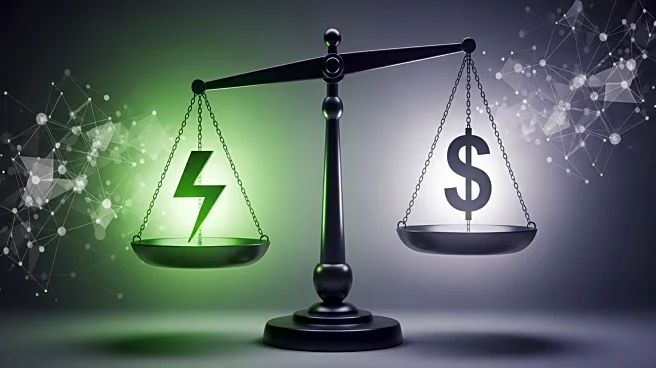What is the story about?
What's Happening?
Lloyd Alter, a prominent figure in environmental discourse, has highlighted the intrinsic link between economic systems and energy consumption. Alter, referencing economist Robert Ayers, argues that the economy functions primarily to convert energy into products and services, generating significant waste and carbon emissions in the process. This perspective challenges traditional economic views by emphasizing the thermodynamic principles governing industrial processes. Alter points out that while renewable energy investments create jobs, they do not perpetuate the continuous consumption cycle seen with fossil fuels, which require ongoing extraction. The discussion also touches on the inefficiency of internal combustion engines, which convert only a small fraction of fuel into usable energy, thus benefiting oil companies and related industries financially.
Why It's Important?
The insights provided by Alter and Ayers underscore the challenges faced in transitioning to renewable energy. The economic reliance on fossil fuels, due to their continuous consumption model, poses a significant barrier to adopting cleaner energy sources. This inefficiency in energy use highlights the need for systemic changes in how energy is consumed and valued. The discussion is particularly relevant as it questions the sustainability of current economic practices and the role of government subsidies in perpetuating fossil fuel dependency. The emphasis on waste and inefficiency calls for a reevaluation of energy policies and the potential for renewables to offer a more sustainable economic model.
What's Next?
The ongoing debate around energy consumption and economic practices suggests a need for policy shifts towards more sustainable models. As awareness grows about the inefficiencies and environmental impact of fossil fuels, there may be increased pressure on governments and industries to invest in renewable energy solutions. The conversation could lead to more stringent regulations on energy efficiency and a push for innovation in clean energy technologies. Stakeholders, including policymakers and environmental groups, are likely to advocate for changes that align economic incentives with environmental sustainability.
Beyond the Headlines
The discussion raises ethical questions about the responsibility of industries and governments in addressing climate change. The reliance on fossil fuels, despite their environmental impact, reflects broader cultural and economic values that prioritize short-term gains over long-term sustainability. This perspective challenges individuals and organizations to consider the moral implications of their energy choices and the potential for renewables to offer a more equitable and sustainable future.

















